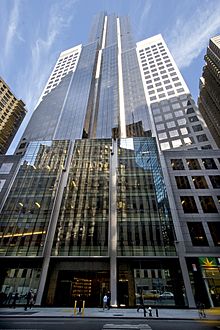 Logo used since 2024 | |
 Random House Tower, New York | |
| Company type | Subsidiary |
|---|---|
| Founded | July 1, 2013 |
| Headquarters | Random House Tower, New York City, New York, United States 20 Vauxhall Bridge Road, London, England, United Kingdom |
Area served | Worldwide |
Key people |
|
| Products | Books |
| Revenue | |
Number of employees | 10,000 (as of July 1, 2013[update]) |
| Parent | Bertelsmann |
| Website | global |
| Footnotes / references [1] | |
Penguin Random House Limited[2] is a British-American multinational conglomerate publishing company formed on July 1, 2013, with the merger of Penguin Books and Random House.[3][4] Penguin Books was originally founded in 1935[5] and Random House was founded in 1927.[6] It has more than 300 publishing imprints. Along with Simon & Schuster, Hachette, HarperCollins and Macmillan Publishers, Penguin Random House is considered one of the 'Big Five' English language publishers.
On April 2, 2020, Bertelsmann announced the completion of its purchase of Penguin Random House, which had been announced in December 2019, by buying Pearson plc's 25% ownership of the company. With the purchase, Bertelsmann became the sole owner of Penguin Random House. Bertelsmann's German-language publishing group Verlagsgruppe Random House will be completely integrated into Penguin Random House, adding 45 imprints to the company, for a total of 365 imprints.[7]
As of 2021, Penguin Random House employed about 10,000 people globally and published 15,000 titles annually under its 250 divisions and imprints.[8] These titles include fiction and nonfiction for adults and children in both print and digital. Penguin Random House comprises Penguin and Random House in the United States, the United Kingdom, Canada, Australia, New Zealand, Portugal, and India; Penguin in Brazil, Asia and South Africa; Dorling Kindersley worldwide; and Random House's companies in Spain, Hispanic America, and Germany.[9][10]
On November 25, 2020, The New York Times reported that Penguin Random House was planning to purchase Simon & Schuster from Paramount Global for $2.175 billion.[11] However, on November 2, 2021, the U.S. Department of Justice sued to stop the deal on antitrust grounds, a suit that eventually succeeded on October 31, 2022.[12][13] The deal formally collapsed on November 22, 2022.[14]
- ^ Milliot, Jim (March 31, 2022). "PRH Had a Record Year in 2021". Publishers Weekly.
- ^ "Penguin Random House Limited overview - Find and update company information - GOV.UK". Companies House.
- ^ Calamur, Krishnadev (October 29, 2012). "Penguin, Random House Announce Merger". NPR. Retrieved October 31, 2012.
- ^ "Pearson, Bertelsmann Confirm Publishing Tie-Up". NPR. October 29, 2012. Archived from the original on October 31, 2012. Retrieved October 31, 2012.
- ^ jaaronson (June 2, 2021). "Welcome to Penguin: We Are What You Read". Penguin Books. Retrieved June 9, 2023.
- ^ "Company history | Penguin Random House". Retrieved June 9, 2023.
- ^ Maher, John (April 2, 2020). "Bertelsmann Now Owns 100% of Penguin Random House". Publishers Weekly.
- ^ Sweney, Mark (March 22, 2021). "UK watchdog investigates Penguin owner's Simon & Schuster takeover". The Guardian. Retrieved November 24, 2021.
- ^ "Welcome to Penguin Random House". PenguinRandomhouse.com. April 1, 2015. Retrieved July 5, 2020.
- ^ "CEO Markus Dohle Announces Penguin Random House Global Leadership Team" (PDF). Penguin Random House. July 1, 2013. Retrieved January 22, 2016.
- ^ Alter, Alexandra; Lee, Edmund (November 25, 2020). "Penguin Random House to Buy Simon & Schuster". The New York Times. Retrieved November 30, 2020.
- ^ Brian Stelter (November 2, 2021). "Justice Department sues to stop Penguin Random House's purchase of Simon & Schuster". CNN. Retrieved November 2, 2021.
- ^ Alter, Alexandra; Harris, Elizabeth A. (October 31, 2022). "Judge Blocks a Merger of Big Publishers". The New York Times. ISSN 0362-4331. Retrieved October 31, 2022.
- ^ Harris, Elizabeth A.; Alter, Alexandra; Mullin, Benjamin (November 21, 2022). "A Huge Merger's Collapse Breaks a Pattern of Consolidation in Publishing". The New York Times. ISSN 0362-4331. Retrieved December 29, 2022.